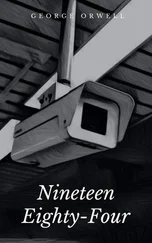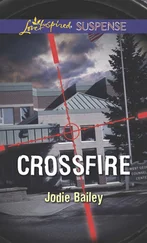“You feel all right, Peter?” Patrick asked. “You hungry?”
The boy shook his head.
“Can I get you anything else?”
Peter put his head down on the table. “I want my mom,” he whispered.
Patrick looked at the part in the boy’s hair. Had he brushed it that morning, thinking, Today’s the day I’m going to kill ten students? “I’d like to talk about what happened today. Would you be willing to do that?”
Peter didn’t answer.
“If you explain it to me,” Patrick urged, “maybe I can explain it to everyone else.”
Peter lifted his face, crying in earnest now. Patrick knew this wasn’t going to go anywhere; he sighed, pushing away from the table. “All right,” he said. “Let’s go.”
Patrick led Peter back to the holding cell and watched him curl up on the floor on his side, facing the cement wall. He knelt behind the boy, one last-ditch attempt. “Help me help you,” he said, but Peter just shook his head and continued to cry.
It wasn’t until Patrick had stepped out of the cell and turned the key in the lock that he heard Peter speak again. “They started it,” he whispered.
Dr. Guenther Frankenstein had worked as the state medical examiner for six years, which was exactly how long he’d held the Mr. Universe title in the early 1970s, before he traded in his barbells for a scalpel-or as he liked to put it, went from building bodies to taking them apart. His muscles were still formidable, and visible enough beneath his jacket to stop the onslaught of any monster jokes incurred by his last name. Patrick liked Guenther-how could you not admire a guy who could lift three times his body weight and yet also know, just by eyeballing a liver, roughly how many grams it would weigh?
Every now and then Patrick and Guenther would grab a few beers together, consuming enough alcohol for the former bodybuilder to tell him stories of women offering to oil him up before a competition or good anecdotes about Arnold, before he became political. Today, however, Patrick and Guenther did not joke around, and they did not talk about the past. They were overwhelmed by the present as they moved silently through the halls, cataloguing the dead.
Patrick met Guenther at the school after his abortive interview with Peter Houghton. The prosecutor had only shrugged when Patrick told her Peter hadn’t been willing or able to talk. “We have hundreds of witnesses saying he killed ten people,” Diana had said. “Arrest him.”
Guenther crouched down beside the body of the sixth casualty. She had been shot in the girls’ bathroom, and her body was sprawled facedown in front of the sinks. Patrick turned to the principal, Arthur McAllister, who’d agreed to accompany them for identification. “Kaitlyn Harvey,” the principal said, his voice haunted. “Special-needs kid…sweet girl.”
Guenther and Patrick looked at each other. The principal did not just identify the bodies; he also gave a little one-or two-sentence eulogy each time. Patrick supposed that the man couldn’t help himself-unlike Patrick and Guenther, he wasn’t used to dealing with tragedy in the course of his normal occupation.
Patrick had tried to retrace Peter’s footsteps, from the front hallway to the cafeteria (Victims 1 and 2: Courtney Ignatio and Maddie Shaw), to the stairwell outside it (Victim 3: Whit Obermeyer), to the boys’ bathroom (Victim 4: Topher McPhee), through another hallway (Victim 5: Grace Murtaugh), into the girls’ bathroom (Victim 6: Kaitlyn Harvey). Now, as he led the team upstairs, he took a left into the first classroom, trailing a smeared line of blood to a spot near the chalkboard where the body of the only adult victim lay…and beside him, a young man with his hand pressed tight over the bullet wound in the man’s belly. “Ben?” McAllister said. “What are you still doing here?”
Patrick turned to the boy. “You’re not an EMT?”
“I…no…”
“You told me you were an EMT!”
“I said I’d had medical training!”
“Ben’s an Eagle Scout,” the principal said.
“I couldn’t leave Mr. McCabe. I…applied pressure, and it’s working, see? The blood’s stopped.”
Guenther gently removed the boy’s bloody hand from his teacher’s stomach. “That’s because he’s gone, son.”
Ben’s face crumpled. “But I…I…”
“You did the best you could,” Guenther assured him.
Patrick turned to the principal. “Why don’t you take Ben outside…maybe let one of the doctors take a look at him?” Shock, he mouthed over the boy’s head.
As they left the classroom, Ben grasped the principal’s sleeve, leaving a bright red handprint behind. “Jesus,” Patrick said, running a hand down his face.
Guenther stood up. “Come on. Let’s just get this over with.”
They walked toward the gymnasium, where Guenther certified the deaths of two more students-a black boy and a white one-and then into the locker room where Patrick had ultimately cornered Peter Houghton. Guenther examined the body of the boy Patrick had seen earlier, the kid in the hockey jersey whose cap had been blown off his head by a bullet. Meanwhile, Patrick walked into the abutting shower room and glanced out the window. The reporters were still there, but most of the wounded had been dealt with. There was only one waiting ambulance, instead of seven.
It had started to rain. By the next morning, the bloodstains on the pavement outside the school would be pale; this day might never have happened.
“This is interesting,” Guenther said.
Patrick closed the window against the weather. “Why? Is he deader than the rest of them?”
“Yeah. He’s the only victim that’s been shot twice. Once in the gut, once in the head.” Guenther looked at him. “How many guns did you find on the shooter?”
“One in his hand, one on the floor here, two in his backpack.”
“Nothing like a little backup plan.”
“Tell me about it,” Patrick said. “Can you tell which bullet was fired first?”
“No. My educated guess, though, would be the one in the belly…since it was the slug to the brain that killed him.” Guenther knelt beside the body. “Maybe he hated this kid most of all.”
The door of the locker room flew open, revealing a street cop soaked by the sudden downpour. “Captain?” he said. “We just found the makings of another pipe bomb in Peter Houghton’s car.”
When Josie was younger, Alex had a recurring nightmare about being on a plane when it went into a nosedive. She could feel the spin of gravity, the pressure that held her back in her chair; she saw purses and coats and carry-on luggage burst out of the overhead compartments to fall into the aisle. I have to get to my cell phone, Alex had thought, intent on leaving Josie a message on the answering machine that she could carry around forever, digital proof that Alex loved her and was thinking of her at the end. But even after Alex had grabbed her phone from her purse and turned it on, it took too long. She’d hit the ground when the phone was still searching for a signal.
She’d awaken shaking and sweaty, even as she dismissed the dream: she rarely traveled apart from Josie; she certainly didn’t take flights for her job. She’d throw back the covers and head to the bathroom and splash water on her face, but it didn’t stop her from thinking: I was too late.
Now, as she sat in the quiet dark of a hospital room where her daughter was sleeping off the effects of a sedative given to her by the admitting doctor, Alex felt the same way.
This is what Alex had managed to learn: Josie had fainted during the shooting. She had a cut on her forehead decorated with a butterfly bandage, and a mild concussion. The doctors wanted to keep her overnight for observation, to be safe.
Читать дальше












